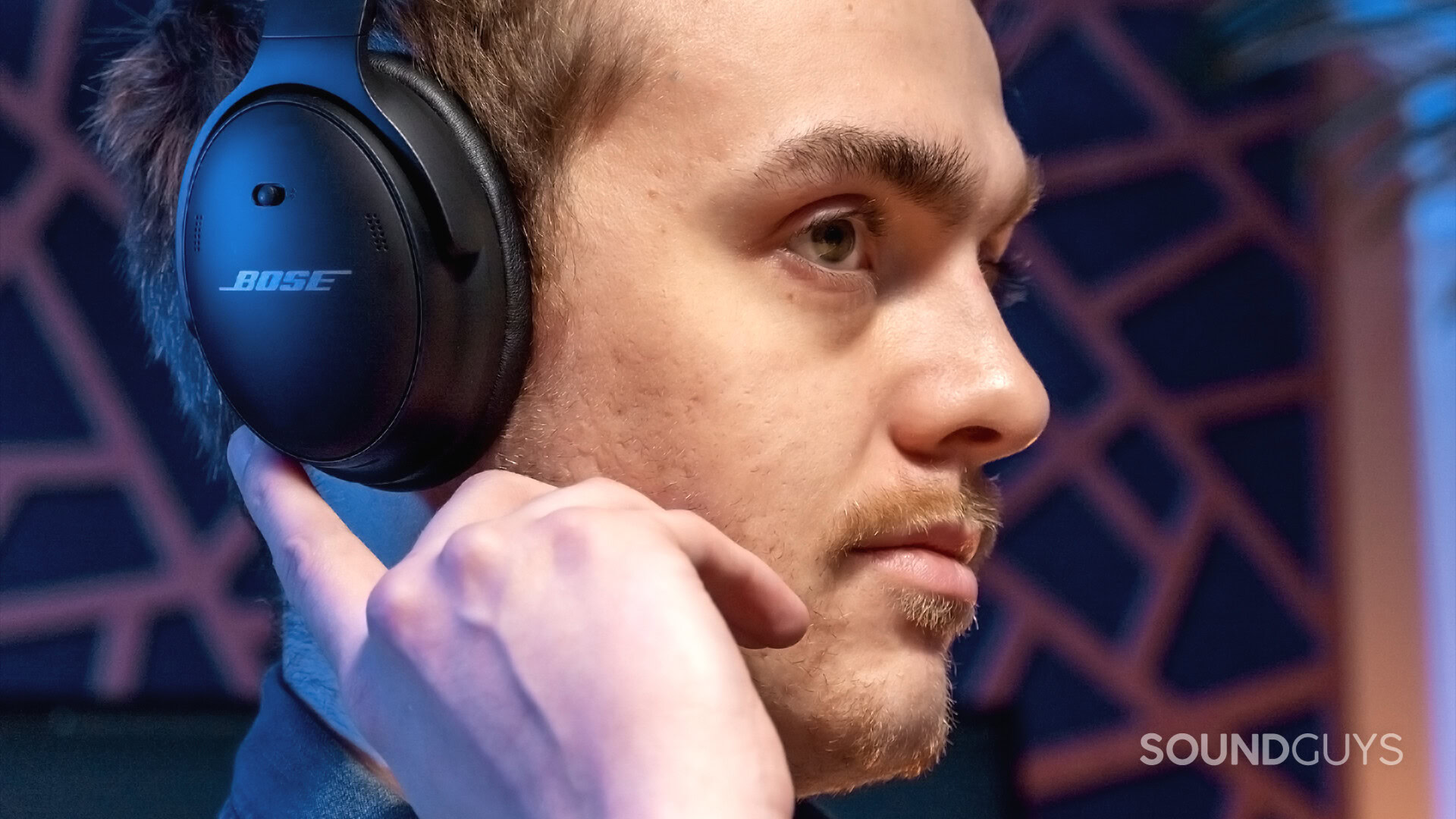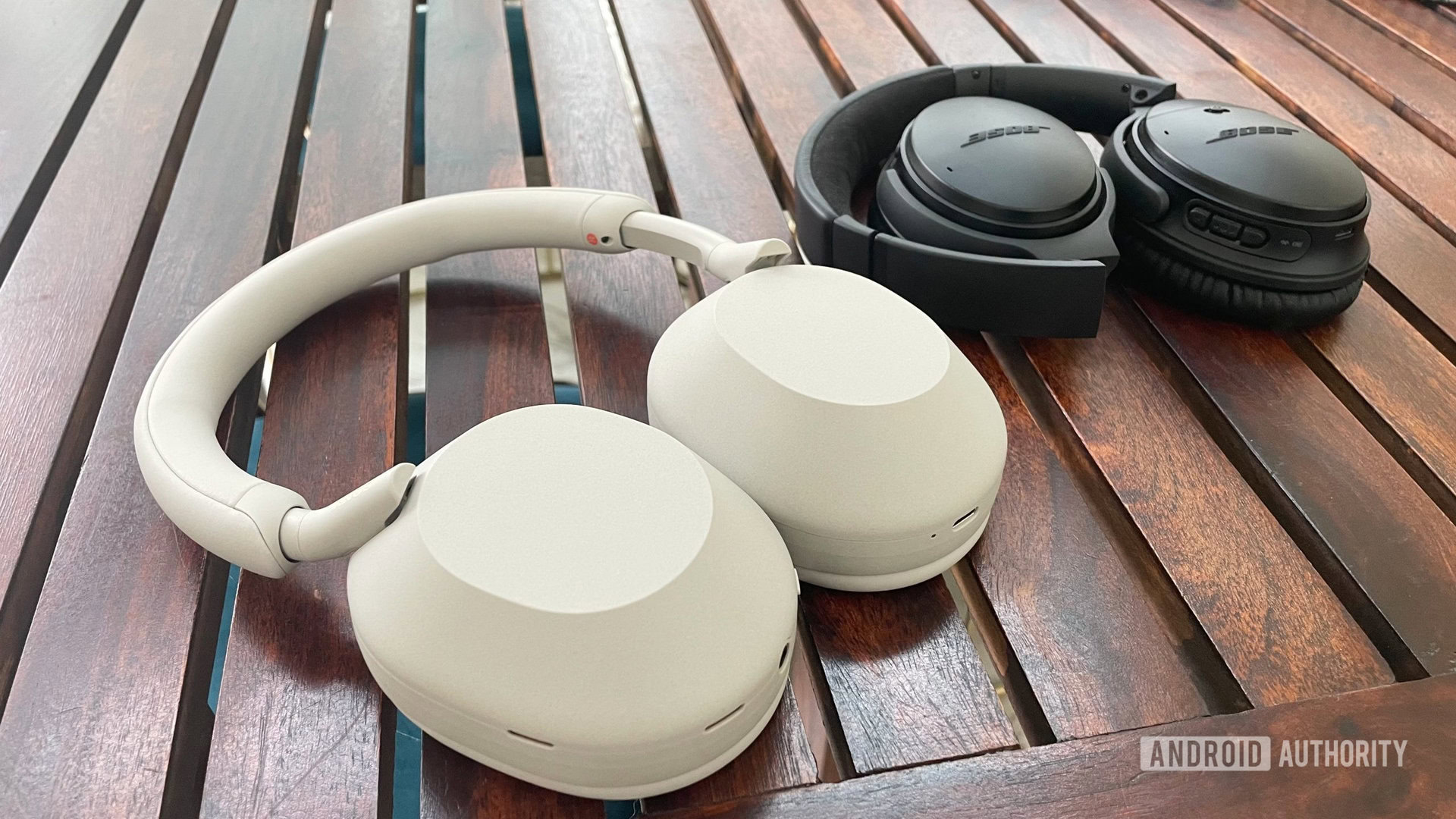Affiliate links on Android Authority may earn us a commission. Learn more.
The two reasons I chose Bose over Sony's best ANC headphones
Published onDecember 17, 2023

As a frequent flier, the rumble of airplane engines and endless drone of crying babies has made active noise canceling headphones my non-negotiable travel companion. And for over half a decade, I reached for the same pair — Bose’s QuietComfort 35 II — every time, until I finally decided to upgrade this holiday season. Even then, I only upgraded because I was ready to ditch my final micro-USB gadget in favor of something with USB-C.
Of course, the Bluetooth audio market has changed quite a bit since 2018 with better noise canceling tech, sleeker designs, features galore, and an explosion of wireless earbuds. Beyond all of that, though, the core values of comfort and build quality matter the most to me. Needless to say, when spending hundreds of dollars on a piece of tech, you’d expect it to last a while.
In the high-end noise canceling headphone market, there are three big brands to choose from: Sony, Apple, and Bose. I visited a local big box electronics store to try the best headphones from all three.
Apple’s AirPods Max seemed great on paper, but their high price tag, Lightning connector, and weight immediately turned me off. I then turned my attention to the Sony WH-1000XM5 and XM4 but found that, despite their feature-rich nature, they weren’t as comfortable as I’d have liked. The thin headbands applied pressure against my skull and the heavy-handed clamping force meant I was quickly itching to take them off. The latter wasn’t as pronounced with Sony’s newer headphones, but those come at a hefty price premium and don’t fold. More on that later.
Apple and Sony have great tech, but fall short in areas that truly matter to me.
Finally, I tried Bose’s new QuietComfort Headphones — I put it off so far because of how similar it looked to my QC 35 II, with the main difference seemingly being the switch from micro-USB to USB-C. Yet, slipping on the QuietComfort Headphones felt like coming home after a long day. The deep and wide ear cups made for an extremely comfortable listening experience compared to the competition. Likewise, I was sure that the breathable earpads wouldn’t cause sweaty ears on long flights.
Maybe I’m a creature of habit, but I was surprised to find that Bose’s design reigns supreme all these years later. Reading reviews and user opinions online, I found many others shared the same sentiment — Bose still makes the most comfortable pair of ANC headphones. Sony may offer better noise canceling as well as fancier Bluetooth codecs like LDAC, but the tech arms race doesn’t matter remotely as much as pure comfort to me.
Bose QuietComfort: Somehow unmatched in durability

The Bose QuietComfort 35 II (QC 35 II) released in September 2017 — or a little over six years ago. Despite that, you’ll find plenty of people using them today. The QC 35 II has some desirable features not present in newer models, like letting you completely disable ANC. Even so, it’s exceedingly rare for enthusiasts in headphone forums to continue using and recommending six-year-old wireless audio products.
The Bluetooth audio space has become extremely commodified in recent years, with older models quickly forgotten about because of battery degradation or build quality issues. Case in point: I considered upgrading to Sony’s then-flagship WH-1000XM3 headphones at one point but quickly changed my mind when I saw reports of spontaneous cracking, rattling, and other issues. Sony then reinforced the hinge on the WH-1000XM4, but the problems have seemingly persisted if the complaints on Sony’s forum and subreddit are to be believed.
Just this year, Bose reused the QuietComfort 45 and 35’s design almost verbatim for its new QuietComfort Headphones. Confusing naming aside, this decision underscores the design’s inherent longevity.
Bose continues to rely on a tried-and-tested design and I'm a big fan.
Sony, meanwhile, has done away with the folding mechanism altogether on its latest WH-1000XM5. That’s certainly an extreme way to fix the series’ long-standing hinge issues, but I’m not thrilled about losing an important feature in the process. Bose’s new QuietComfort Ultra Headphones sport a posher design too, but thankfully, it still folds.
Circling back to my upgrade then, my gushing praise for Bose has probably clued you in on my decision already. As much as I wanted the best in noise canceling performance, I couldn’t say no to the tried-and-tested QuietComfort design. The $249 sale price was the cherry on top that pushed me over the edge.
To be clear, I don’t think the QuietComfort Headphones are perfect for everyone. I wish Bose brought back the option to turn off ANC, supported newer Bluetooth technologies, and offered spatial audio without the QuietComfort Ultra upcharge. But at the end of the day, I can take solace in knowing that I won’t have to fight for warranty coverage over a broken hinge or pay hundreds of dollars for an untimely replacement.
